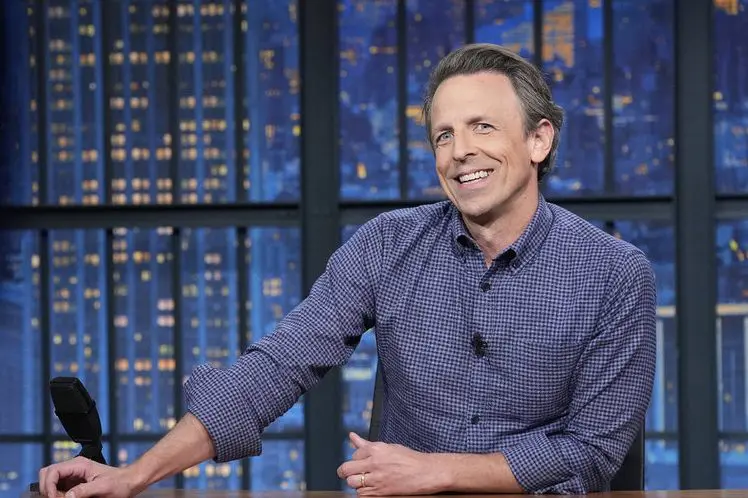Seth Meyers ridicules GOP’s desperation as election approaches
As the election day looms closer, Seth Meyers didn’t hold back in his critique of Republican politicians and their tactics to bolster support for Donald Trump. In a fiery segment of “A Closer Look,” the “Late Night” host skewered the GOP’s strategies.
Election tactics: baseless allegations and bizarre complaints
Seth Meyers highlighted several examples of what he referred to as “unhinged allegations.” He pointed out how the Republicans were concluding their campaign with claims of cheating, complaints about comedy shows, proposals to ban vaccines, and threats to retaliate against perceived enemies, including suggestions to outlaw polls and penalize speech they opposed. “Trump is not being subtle about the threat he poses. He’s dangerous,” Meyers stated bluntly.
Comedy shows under fire: “Saturday Night Live” controversy
One of the primary examples of GOP’s backlash highlighted by Meyers was the recent uproar over Kamala Harris’ cameo on “Saturday Night Live”. Harris appeared in a mirror skit opposite Maya Rudolph, who has been impersonating her throughout the show’s 50th season. The satire led to Republican ire, with accusations of bias and unfair treatment.
FCC involvement: complaints and threats
The controversy took another twist when a Trump-appointed FCC commissioner, Brendan Carr, took to social media accusing NBC of evading the FCC’s Equal Time rule. The rule mandates that no legally qualified candidate should receive less airtime than their opponents outside of legitimate news coverage. Despite the claims, it was noted that SNL had not extended an invitation to Trump, bringing into question the validity of Carr’s accusations.
Seth Meyers’ humorous retort: a deft use of sarcasm
Seth Meyers responded to the threat of FCC action with trademark sarcasm. He aired clips of both Carr and Florida senator Marco Rubio expressing their grievances. When Carr suggested that NBC might face license revocation, Meyers deftly turned the situation into a punchline. “You wanna revoke NBC’s broadcast license?” Meyers quipped, adding, “Well, joke’s on you. NBC doesn’t have a license. It expired in 2005 and we forgot to fill out the paperwork for a new one, so for the last 19 years, we’ve been broadcasting illegally from the back of a sprinter van that just circles Times Square.”
FCC rules and the media landscape
The Equal Time rule is a longstanding regulation intended to ensure fairness in political broadcasts—a principle Meyers mocked in his segment. The broader context of how media interacts with politics is layered and complex, and Meyers’ show regularly examines these intersections with wit and insight. The use of humor to address serious allegations reveals a calculated effort to highlight the absurdity while informing the audience about democratic safeguards.
Campaign trial: addressing potential FCC violations
Attempting to mitigate any potential fallout, NBC aired a Trump campaign spot during both the NASCAR Xfinity 500 race and the Colts-Vikings NFL game. This move appears directed at addressing any claims of unequal airtime, highlighting the network’s proactive approach to regulating compliance.
Additional insights: industry trends and implications
This incident underscores the increasingly blurred lines between politics and entertainment. The ability of comedy shows like SNL to influence public opinion—sometimes more profoundly than traditional news outlets—marks a significant trend in how information is consumed and processed. It’s crucial to consider these dynamics when examining the media’s role in modern elections.
Such moments also delve into the evolving nature of broadcast regulations, signifying a shift in how industries adhere to or circumvent longstanding rules. Meyers’ segment is a reminder of the power dynamics at play and the ongoing battle for narrative control in an age of instant information dissemination.
Keep following our site for further insightful updates on entertainment, media, and their impact on politics. Share this article to spread the word about the intriguing intersections between comedy and political campaigns.

 Italian
Italian







